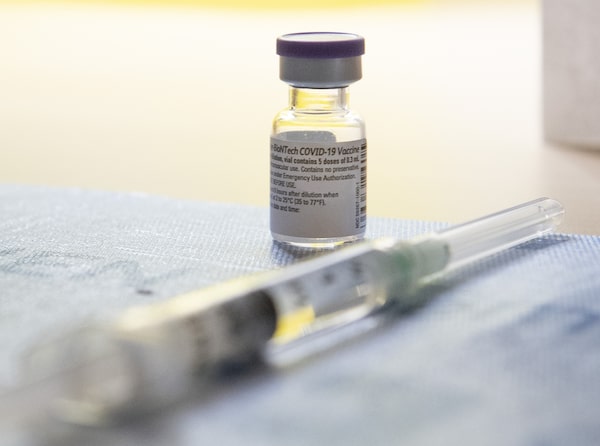
The first Pfizer-BioNTech COVID-19 vaccine dose in Canada sits ready for use at The Michener Institute in Toronto on Dec. 14, 2020.Frank Gunn/The Canadian Press
British Columbia’s public-health officials are continuing to prioritize the delivery of second doses of its limited supply of COVID-19 vaccines, while it reviews a growing body of evidence that suggests it would be more effective to focus on first doses for more people.
Since vaccine supply began to arrive in December, British Columbia has administered 193,000 vaccines, including 37,000 second doses. The largest number of vaccines delivered in a single day in B.C. was on Thursday, with 12,251 people immunized. “More than half of those were second doses, reflecting the need to do that work,” Health Minister Adrian Dix said.
The BC Centre for Disease Control, or BCCDC, released two reports this week which conclude that the vaccines being used in Canada are more effective after a single dose than initially promised. Similar findings were published in The Lancet medical journal, based on a study of 9,000 health care workers from Israel, and in an analysis by the Institut national de santé publique du Québec. Both those reports were released Thursday.
Ontario extends stay-at-home orders for Toronto, Peel as modelling warns of third wave
‘No runway left’: Retailers rattled as COVID-19 lockdowns extended in Toronto, Peel Region
The conclusions support the approach in Britain and in Quebec, where second doses are being delayed by up to 90 days – significantly longer than the manufacturers’ recommendations. British Columbia has already pushed back second doses to 42 days and has acknowledged that thousands of people will not receive their second dose within that window.
“We need to recognize that every time we administer a second dose to someone, we are depriving other high-risk individuals of that very substantial protection that they could have got from the first dose. It’s as straightforward as that,” Danuta Skowronski, lead for the influenza and emerging respiratory pathogens team at the BCCDC, said in an interview.
Dr. Skowronski is the lead author of a letter in the New England Journal of Medicine published Wednesday that says the two vaccines currently available in Canada are more effective than the manufacturers have estimated. An analysis found the Pfizer–BioNTech vaccine is 92.6-per-cent effective after the first dose, while Moderna’s vaccine was 92.1-per-cent effective after the first dose.
“Given the current vaccine shortage, postponement of the second dose is a matter of national security,” the article concludes. Adjusting vaccine plans to give priority to first doses will save lives, the research concludes.
“That’s absolutely a game-changer, because it says the second dose is adding very little to the protection that you are getting,” Dr. Skowronski said. “So what we are advocating, while the epidemic activity is still elevated and while the vaccine is in scarce supply, is that we more strategically deploy that limited vaccine to make sure we get at least a first dose into as many arms as possible, especially amongst those at high risk and our health care workers, before doubling back to make sure we top up an eenie-weenie bit of extra vaccine protection in those who have already got their first dose.”
As well, her research team found early vaccine effectiveness results within B.C. show the first dose of COVID-19 vaccine reduced the risk of infection in long-term care residents and health care workers by 80 per cent within two to three weeks of immunization. That is especially welcome news for residents of long-term care, who have accounted for the majority of COVID-10 deaths in the province.
Reka Gustafson, deputy provincial health officer, told reporters Friday there is an active debate about changing B.C.’s approach.
“What we’re trying to do is maximize the protection from the available vaccines to the entire population,” Dr. Gustafson said Friday. “I would say that the data are being looked at very, very carefully and evidence is accumulating to support that as a potential approach for maximizing protection in the population.”
The initial COVID-19 vaccinations in Canada and around the world raise questions about how people react to the shot, how pregnant women should approach it and how far away herd immunity may be. Globe health reporter Kelly Grant and science reporter Ivan Semeniuk discuss the answers.
The Globe and Mail
We have a weekly Western Canada newsletter written by our B.C. and Alberta bureau chiefs, providing a comprehensive package of the news you need to know about the region and its place in the issues facing Canada. Sign up today.
 Justine Hunter
Justine Hunter